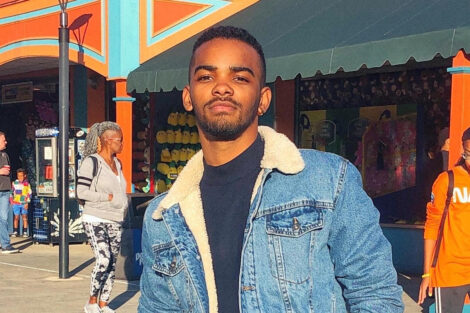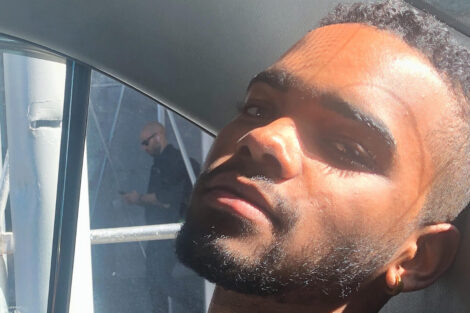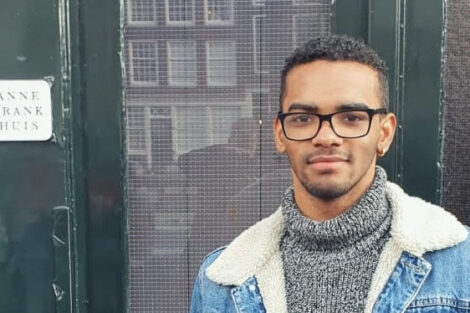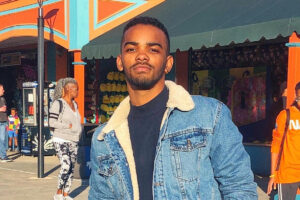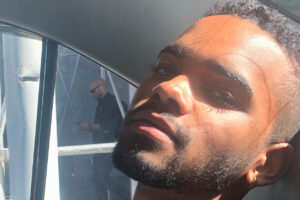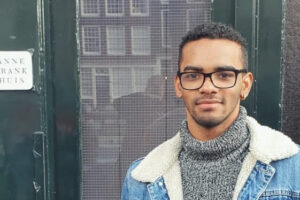What’s your home and family background?
I was born and raised in the Dominican Republic until I was nine years old and my immediate family had the opportunity to move to the United States. And we’ve been living in NYC, Bronx, ever since we immigrated. Needless to say it was a struggle to adjust to the American culture and having to learn a new language. I have three siblings: Omar, who is 24; Yasmin, 19; and Yamileth, 15. I am 21 years old. I also have a very beautiful pet: He is a Matisse, and his name is Cookie. He just turned one year old in human math, and he is so annoying but also so cute.
What was your favorite class or two last school year and why?
While abroad in Amsterdam this past semester, I really loved my English/creative writing classes, although I did not perform as well as I’d like to. The semester before, I loved—loved—my independent study with Prof. Randi Gill-Sadler. I got to write poetry and get instant feedback one-on-one. It was the greatest choice I’ve ever made, and I would do it again in a heartbeat.
Who are a few professors who have made an impact on you?
There are so many professors I am profoundly thankful for; they have taught me so much in such little time, that I will forever take that experience with me— perhaps beyond my years. For the sake of the length of the interview, I will only list three professors, who have helped me with my writing and have impacted the way I look at myself as a writer: Randi Gill-Sadler, Megan Fernandes, and Lee Upton.
What was the highlight of the school year for you?
Without a doubt going abroad was the best decision I’ve ever made. Although it was cut short, I met the most amazing and unique people. I became very close to my roommate from Amsterdam. In fact, I have been visiting him in Florida this summer, and we plan on keeping the friendship going. He became one of my closest friends.
What inspires and motivates you as a writer? What are you trying to accomplish with your writing?
Here’s the thing about my writing: It requires a kind of profound meditation that is yet to be within my grasp. I don’t possess such a thing yet, and I don’t think I ever will, really I don’t. My writing goes—it falls flat by the will of who knows what. Although it comes to me, every now and then, I struggle with the dimensions I want to reach through the limitations of writing itself; I want to reach the core, the true essence, the very source of my very being. But nevertheless, it falls flat without me. I want to reach myself in such a deeply profound way and want it done so seamlessly, it appears nearly impossible. A word, or a beautifully crafted sentence I write could never capture that which has not already been captured by many before. You understand. I cannot possibly reach what hasn’t already been reached—whether it be peace, or love or the mere fabrication of it, as pathetic as that sounds. I can never undo myself the way I want to. Oh is woe is me?
This next sentiment has already been expressed before by far more gifted writers than I, which is why I’m repeating it back to you: My writing holds me hostage, though I understand, every now and then, that sometimes there’s no turning back. Writing poetry opens so many wounds, yet it carefully builds such joy once I reach a point of contentment with what I’ve crafted that I simply can’t help myself but want to revisit the feeling again. And who would stop themselves from writing when it can save a life or two? Here I kindly hand you back your pity, if any.
Clarice Lispector once said, “You do not understand music, you hear it.” Well, much like she who has inspired, in these last couple of months, the way I look at writing in general, I want to be like music. And I have always felt that way, even before I discovered her carefully crafted, and dare I say, underrated work. I am not particularly interested in being understood. I want to be heard or else felt. I want to be felt in a way that goes beyond language, beyond myself, or the fabricated self I seem so well to perform in front of strangers—even my closest friends. In a way I’m performing for you now. And soon enough I’ll withdraw the curtains and go on with my life, glazing over the pathetic vulnerability I hereby showcase to you.
Do not be mistaken; I don’t always sit down to write nor do I always carry myself trapped in this mindset. I do not wish that upon anyone. Please imagine for a second what that kind of life would lead you to. You can’t—not really. Not without seeing a near end to that life, that is no way to live, truly live. It will leave you mad. But when I can’t get it out of my head that I must write, I pull up my phone or my laptop or rarely my notepad and start to write as if recreating myself anew. And I feel a disquieting happiness when I finally declare a poem or a short story finished, after days, weeks or even months of editing it. And all I want to do is walk away from it and leave it for good. But it always pulls me to it. I’ve yet so much to learn.
What are your hopes and plans for your career?
I hope to one day be published and be able to make a living off my writing. Ideally, I’d like to work in publishing as well, and eventually become a professor at a college much like Lafayette. I am aware that this is a dream I share with many aspiring writers, which does make me a bit uneasy, but I know ultimately this is where I want to be headed. I also know that it will take a while to get there, and I might even have to change my plans. But for now, my answer still stands.
How has what you've learned in women's and gender studies impacted you?
Coming into Lafayette I knew I wanted to be an English and WGS double major. Being part of the WGSS department, especially with Mary Armstrong as head, has been incredibly rewarding. I’ve learned so much about the world around me sometimes it drives me mad. It is a dangerous department to be a part of, if I’m honest. You learn about things that are so real, and so obvious once you’ve heard them, that it is a struggle to repeat those things back to your friends and family without them giving you a hard time, or perhaps not wanting to see what you see. You realize how the construction of the world in which you live has the chance to redeem itself, but you’re also made aware that it will take a very, very long time. Other than what I’ve learned in those classes, I’ve learned about patience and forgiveness, especially to myself and the flawed way I see the world.
What have you taken from your experiences in publications?
Admittedly my role in The Marquis and Rise Magazine is very little. But The Lafayette is a different story. I became the arts and culture editor second semester of freshman year, and I couldn’t be more thankful. Now that I am a senior, I am looking forward to continuing my position as arts and culture editor. I’ve learned so much: I’ve learned about editing, journalistic writing, but most importantly how to patiently meet people where they’re at. I’ve never been around such hard-working people as those working for the newspaper. They inspire me every day to push myself even further and not be afraid of potential backlash. I’ve learned a lot about integrity, pride, and growing a thicker skin.
What does Posse mean to you?
I feel incredibly privileged to be part of Posse. Without my Posse mentor or fellow Posse students I wouldn’t be where I am today. We went from skeptical strangers to close friends in a span of three, almost four, years.
What's it like being a McKelvy Scholar?
Being a McKelvy Scholar feels very special. Although I only spent a semester as a McKelvy Scholar before I had to go abroad, I met very intelligent and driven people. I can’t wait to continue my journey as a McKelvy Scholar.
Where can we read your writing?
I believe freshman year I won the Jean Corrie Poetry Prize at Lafayette. That is one of the highlights of my entire college career. I was published in the Academy of American Poets. Admittedly my writing has changed a lot from the time I got published, but I still hold this prize with pride, despite the severe editing that this poem needs, haha. I am currently trying to publish more of my work in other literary magazines, and have received hopeful rejection letters. I hope to receive a “Congratulations, you’ve been published!” letter soon.
Anything I’ve missed?
This is actually something I’m very happy and proud of. One day I stepped into the office of one of my favorite professors, Megan Fernandes. As we got onto talking about random things and writing, she asked for my help with editing one of her poems in her new poetry collection, Good Boys. Needless to say, she was considerate enough to include me as one of the people who helped her with the book on the back page. I didn’t expect that to happen, and part of me felt I didn’t do enough, but I will forever appreciate it with my entire heart. I wish all the best for her truly.
